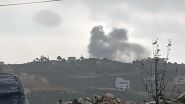
An independent emergency committee has been established by the national commission for missing and forcibly disappeared persons to investigate the fate of these individuals.
The number of people reported missing during the Lebanese Civil War was previously estimated at 17,415. Additionally, between 200 and 700 Lebanese were believed to have been detained in Syria after being abducted during the three decades of Syrian military presence in Lebanon. However, these figures are incorrect and require a thorough reassessment, particularly following the fall of Bashar al-Assad’s regime and the release of detainees, including Lebanese citizens.
In an interview with This is Beirut, Carmen Abou Jaoudeh, a transitional justice expert and member of the national Commission for missing and forcibly disappeared persons, emphasizes that this is “an extremely complex dossier that has been politically exploited” for decades. She adds that “all data collected so far are inaccurate and need to be reexamined” and notes that “the independent national Commission, mandated with a humanitarian mission, will validate the information in coordination with civil society and Lebanese authorities. It will also be necessary to wait for the situation in Syria to clarify and for the new Syrian government to be formed.”
Abou Jaoudeh explains that “the estimate of 17,415 missing persons is based on the number of complaints filed by family members with the relevant Lebanese authorities during the war, up until 1992, following the disappearance of one or more relatives. However, while some of these individuals may still be detained in Syrian prisons, others might be already dead, making it difficult to provide a precise estimate. The politicization of this dossier has further complicated and obscured the facts, with the Syrian regime consistently denying the presence of Lebanese detainees in its prisons. Additionally, both Lebanese and international human rights organizations, including the International Committee of the Red Cross (ICRC), estimate that the number of documented disappearances ranges between 5,000 and 8,000.
It is important to note that the national Commission for missing and forcibly disappeared, an independent body responsible for overseeing this dossier, was established in 2020 following the enactment of Law 105 on the Missing in 2018. This law guarantees families the right to information and outlines the creation of investigative commissions. This law is the result of extensive efforts that began in the late 1990s, spearheaded by, among others, the Committee of families of kidnapped and disappeared in Lebanon, along with various civil society organizations.
The Committee of families of kidnapped and disappeared is an NGO founded in 1982 by Wadad Hlawani and family members of those kidnapped and disappeared during the Lebanese Civil War. Halawani, whose husband disappeared in 1982, has served as the Committee’s chair and has been at the forefront of this cause ever since, tirelessly advocating for the full transparency and the truth about the fate of the missing.
During a press conference held in Beirut on Saturday, December 7, Halawani stated that the news of the release of detainees in Syria had brought a sense of cautious optimism to families, some of whom were hopeful of finally hearing from their missing loved ones. She urged the authorities to swiftly act to verify the identities of the released detainees and provide answers to those who have been searching in vain for years. “The Lebanese State needs to take action now,” she said, calling on anyone with relevant information to reach out to the committee or the national Commission for the missing and forcibly disappeared. Among the “confirmed cases,” she mentioned Ali Hassan al-Ali, who was arrested at a Syrian checkpoint in northern Lebanon at the age of 18 and was released on Saturday evening from Hama prison.
“In human rights law, ‘disappeared’ refers to individuals who went missing during an armed conflict. ‘Enforced disappearances’ specifically refer to those who were abducted or detained by a state or non-state actor,” explains Abou Jaoudeh. “Detainees in Syria were previously classified as 'enforced disappearances,' but their fates were unknown,” she adds. However, she emphasizes that “things will now be clarified. It will be possible to identify who was imprisoned and who remains missing, as some individuals, for instance, were killed under torture or buried in mass graves in Lebanon or Syria.”
The national Commission’s mission is to determine the fate of all missing persons, without exception, to exhume mass graves, identify the remains, and return them to their families. This is an extensive and demanding process that requires substantial resources and specialized expertise.
In a press release dated Friday, December 6, the national Commission for the missing and forcibly Disappeared announced that it’s “actively engaging with official authorities, agencies, and relevant local and international organizations to gather all available information regarding the release of Lebanese nationals and residents from Syrian prisons, as well as the fate of those missing and abducted in Syria.” The Commission further urged “all individuals and entities, including civil society organizations, to share any information they may have and to collaborate in efforts to locate the missing and abducted.”
The commission solicited “families of the missing and abducted, their relatives, and active associations and organizations in the domain, who believe their loved ones may be in Syria or among those released from Syrian prisons, to share any relevant information or data to support its mission.”
It reaffirmed its dedication to “exclusively preserving, analyzing and processing this data in line with the humanitarian mandate entrusted to it under Law 105/2018.”
The Commission also announced plans to hold a press conference shortly to outline the procedures it will follow in the next stages of its work.




Comments